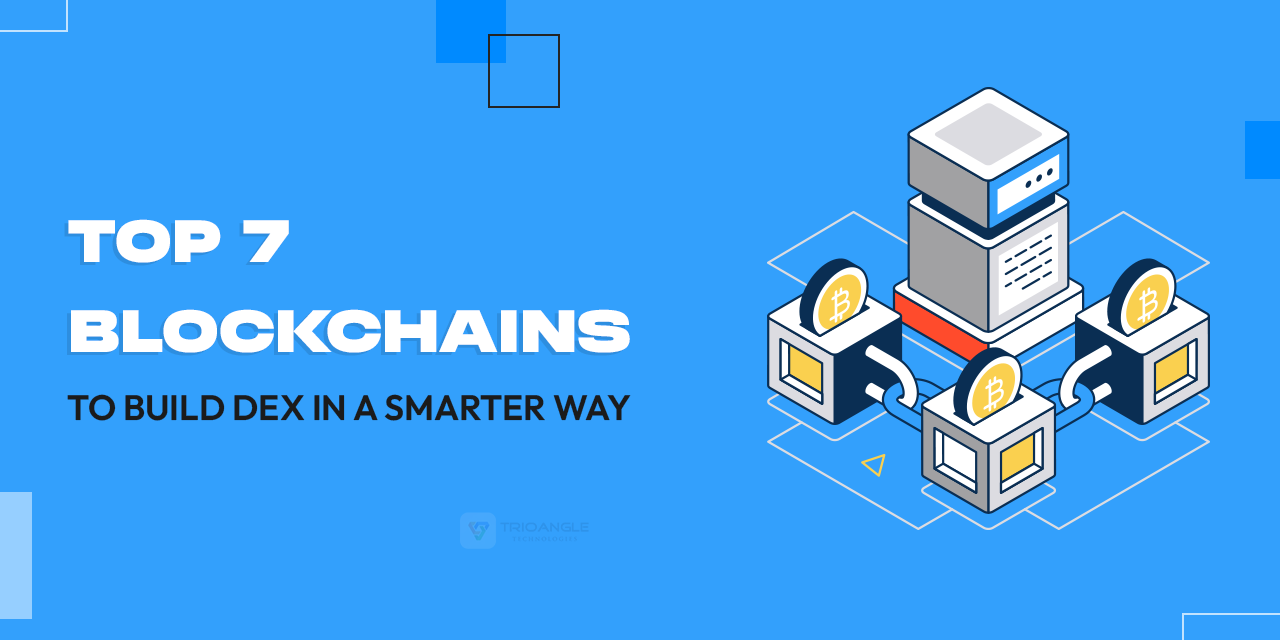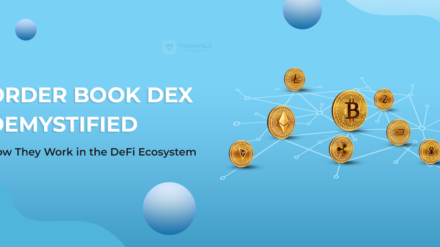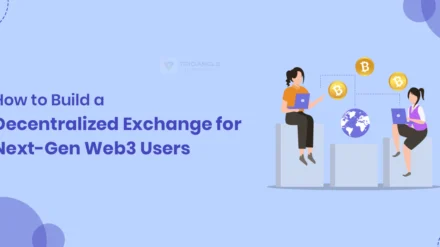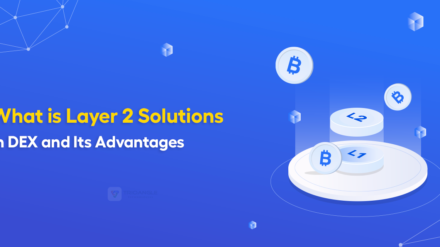Everyone is talking about blockchain technology nowadays. It is used in various sectors, including finance, logistics, healthcare, and more. Major companies like Amazon use blockchain technology on AWS (Amazon Web Services) to offer their users secure, transparent, and efficient services. If you’re thinking about launching your own DEX for the first time, you already know that the blockchain is the heart of your platform. If you’re unsure which blockchain network is best and why, this blog will help clarify things for you. Here, let’s explore the top 7 blockchains to build DEX. At the end of this blog, you’ll know which platform fits your goals, budget, and your users’ needs.
So, let’s dive deeper into the topic now!
Equipping your DEX with the perfect blockchain network is most important. “But why?”
Before exploring the top 7 blockchains to build DEX, let’s see…
Why Picking The Best Blockchains to Build DEX is Important
The blockchain network impacts the overall performance of your decentralized exchange platform. Here’s where they play a major role.
Transaction Speed: The blockchain on your DEX impacts how quickly trades confirm on your platform. Users prefer simple and fast transactions. If your DEX facilitates faster transactions, it provides an added advantage in attracting more users.
Gas Fees: Effective blockchain consumes fewer gas fees and conducts faster transactions on your platform. If your DEX deducts high gas fees, users will step away. A reliable gas fee is important to get more user volume.
Security: More than a thousand blockchains exist in the Web3 space. Some are battle-tested, while others are newer. To create a platform that handles millions of dollars more securely, you need a proven network.
Ecosystem & Liquidity: A blockchain network plays a major role in attracting liquidity on your platform. Liquidity creates higher liquidity, so chains with significant DeFi TVL help your DEX succeed.
Keep these factors in mind as we go through our core topic, “Top 7 blockchains to build DEX”. By the end, you can know which blockchain is suitable for your brand-new decentralized exchange software.
Top 7 Blockchains to Build DEX
Here’s the list of the best blockchain networks that help you run your DeFi venture effortlessly.
#1 Ethereum
Ethereum is the first popularized blockchain network that implements smart contracts, which serve as a foundation for many DeFi protocols. This network allows your DEX to connect with various things like oracles, stablecoins, and lending protocols more easily. With the support of a huge community of developers and big institutions, Ethereum will be a reliable choice for your DEX platform.
Key Points To Consider:
- Ethereum’s total value locked (TVL) in Q1 of 2025 is more than $100 billion (approx).
- It can conduct 12-15 (TPS) transactions per second.
- It finalizes the transaction in 1 to 2 minutes.
- This network asks users $8 to $12 (approx) per swap.
Pros:
- Extremely secure and decentralized.
- Huge liquidity is available in the network, users can trade assets easily.
Cons:
- Ethereum can consume high gas fees and facilitate slower transactions when the network gets busy.
#2 Binance Smart Chain (BSC)
The Binance Smart Chain mirrors Ethereum’s smart contract model but concentrates on providing faster transactions by consuming low gas charges. You can opt for this network if your platform needs to conduct faster transactions with fewer charges to your users.
Essential Considerations:
- As Q1 of 2025, this network gained over 5 to 6 billion dollars of total value locked (TVL).
- Block time is approximately 3 seconds, with finality usually achieved in under 10 seconds.
- Each transaction costs around $0.06 to $0.12 in gas fees.
Pros:
- Conducts blazing-fast transactions with less gas fee consumption.
- Comes with Ethereum’s robust characteristics. This network can be easily integrated with existing Ethereum-based protocols.
Cons:
- This network may feel less decentralized because it has only 21 validator nodes using proof of stake authority (PoSA).
#3 Solana
Solana blockchain has the power to process transactions under 500 milliseconds. This network can deal with more than a thousand transactions per second. If you want to offer super-fast transactions on your DEX, you can go for Solana.
Important Factors To Keep in Mind
- Total value locked (TVL) over $9.6 billion USD.
- In theory, this network can process over 65000 transactions per second (TPS). But experts say that it will be slightly lower than 65k TPS.
- This platform consumes approximately $0.001 to $0.01 per swap.
Pros:
- Highly secure with hundreds of validators, and it’s getting stronger with frequent upgrades.
- It consumes lower gas fees.
Cons:
The network has experienced occasional outages, but it’s getting better with recent improvements.
#4 Polygon (POL)
Polygon blockchain is an Ethereum side chain that ensures security by regularly syncing with the Ethereum mainnet. This network works more effectively on the Ethereum-based DeFi protocols.
Key Information
- This network has approximately $0.75 million total value locked (TVL).
- Polygon conducts 30 to 60 transactions per second (approx).
- It concludes transactions in less than 2 seconds.
Pros:
- Polygon can connect with other major blockchains easily.
- Makes transactions with very low charges.
Cons:
- Security depends on Polygon’s own group of validators.
#5 Avalanche
Avalanche is built with a multi-chain architecture. It splits up the task across three chains. It uses X-Chain for sending and receiving assets, C-Chain (which works like Ethereum) for smart contracts, and P-Chain for managing validators and custom blockchains.
Key Points To Consider:
- This network had more than $1.48 billion in total value locked (TVL) as of Q1 2025.
- Avalanche blockchain facilitates 4500+ transactions per second (TPS).
- It takes approximately $0.04 per swap.
Pros:
- Avalanche blockchain is highly adaptable and completely customizable.
- This network works well with Ethereum-based solutions.
Cons:
- Costs are a little elevated compared to other layer 2 networks.
#6 Fantom Opera
Fantom Opera is one of the most underrated blockchains to build dex. It uses DAG-based Lachesis consensus to finalize transactions in one second.
Essential Insights:
- The total value locked (TVL) in the Fantom Opera platform is approximately $0.024 B
- The transaction was done in less than one second.
- This network consumes $0.01 as a transaction fee (approx).
Pros:
- Supports bridges on other top networks.
- Fast finality.
- Consumes very low gas fees to facilitate transactions.
Cons:
- Compared to Ethereum and Binance Smart Chain (BSC), Fantom Opera is less used in DeFi projects.
- Fantom has good liquidity, but it’s fragmented across different platforms, so finding large pools is harder than on Ethereum or BSC.
#7 Arbitrum
Arbitrum is an optimistic rollup that processes transactions off-chain and uses Ethereum to shield from attacks. It is a layer 2 solution that cuts gas fees over 90% while maintaining Ethereum’s security.
Things To Keep In Mind:
- The total value locked (TVL) in the Arbitrum network is approximately 11.5 billion USD.
- This network takes $0.10 to $0.20 in swapping charges. Sometimes it requires $0.30, specifically at the peak times.
- Arbitrum takes between 10 seconds and 1 minute to finalize transactions.
Pros:
- Offers robust security for Ethereum.
- Gas fee charges are low.
Cons:
- It may take as long as seven days for withdrawal.
- User experience feels slow when compared to other L1 networks.
Right. Now you have explored the topic “Top 7 Blockchains to Build DEX In a Smarter Way”. So, it’s time to wrap up.
Final Thoughts
When building a DEX, selecting the right blockchain network is important. You need to equip your decentralized exchange platform with a network that perfectly matches your business and user requirements.
I hope this blog helps you determine which network best suits your platform. If you’re still unsure about which blockchain is best for your DEX, then you can get assistance with Trioangle, a leading decentralized exchange development company. They help you build all decentralized applications and align your platform with the right network by analyzing your business vision.
Start building your decentralized exchange with our expert team.








